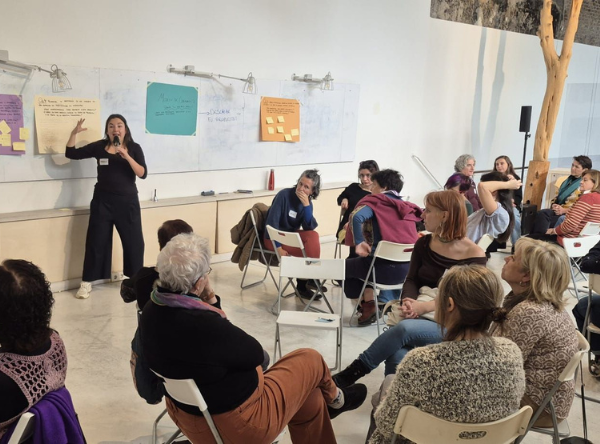Share this post:

Article based on a series of publications by FEBEA members such as Fiare Banca Etica, Hefboom, Crédal, France Active or Community Finance Ireland. Read the original articles on their sites.
On 25 November, the International Day for the Elimination of Violence against Women is commemorated, highlighting the urgent need to address and eradicate all forms of violence affecting women worldwide. Beyond physical and psychological abuse, in this article we want to focus on economic violence as a form of harm that limits millions of women’s autonomy and well-being.
Gender-based violence is not limited to physical or psychological abuse; it manifests in many ways, including economic violence, which is often overlooked. According to the European Institute for Gender Equality, economic violence is defined as ‘any act or behavior which causes economic harm to an individual’.
In broad terms, it can be manifested in forms of economic control (preventing, limiting or controlling a victim’s finances and related decision-making), economic exploitation (using the economic resources of a victim to the abuser’s advantage) or economic sabotage (preventing a victim from pursuing, obtaining or maintaining employment and/or education). Economic violence has direct consequences for victims of gender violence since control over economic resources is one of the main reasons that constrains women’s possibilities of leaving abusive relationships.
Lack of access to financial services, financial education, and adequate economic opportunities is a form of violence that affects many women around the world. One way economic violence appears is through financial exclusion, which results in:
Financial exclusion of women is not only an economic issue but is also linked to the perpetuation of patriarchal power and control. Limiting women’s access to financial resources places them in a position of dependence and vulnerability, which can be exploited by abusive partners or family members who use financial control as a way to exercise authority and maintain women in situations of abuse. In addition, lack of economic autonomy makes it harder for women to make key decisions about their lives, such as leaving abusive relationships or seeking help, trapping them in cycles of abuse that are difficult to break.
On the International Day for the Elimination of Violence against Women, it is essential to highlight financial exclusion as a form of gender-based violence. Ethical finance organisations across Europe, represented by FEBEA, actively develop mechanisms to ensure the financial inclusion of the most vulnerable groups and to guarantee women’s access to finance across Europe, who often, as mentioned above, experience various forms of exclusion. According to FEBEA’s Charter, Ethical Financiers “respond more and more to the needs of those who are excluded from the financial system, and to the needs of savers and investors who want to achieve a positive societal and environmental impact with their savings.”
The FEBEA members Fiare Banca Etica and the Banca Etica Group work to promote financial education for women, ensure equal access to financial services, and create opportunities for women to start businesses and initiatives. They also work to raise awareness about economic violence and promote greater sensitivity to this issue.
Banca Etica’s commitment to promoting gender equality and women’s empowerment has been present since the beginning of its activity, which started on 8 March 1999. In 2022, Banca Etica financed 327 women-led enterprises in Spain and Italy, representing 25.2% of the organisations and businesses financed by the bank that year, for a total of 49 million euros, compared to 22% in the general financial sector. On the International Day for the Elimination of Violence against Women, it is a reminder that eradicating economic violence is an integral part of the struggle for gender equality and the protection of the human rights of all women worldwide.
Addittionally, in 2025 the Bank supported the writing of the book Il coraggio di contare. Storie di donne, finanza ed etica nell’Italia contemporanea. The journalist Natascha Lusenti gathers several testimonies from different women telling their stories as victims of economic violence.
A case study carried out by France Active in 2025 identified, for example that the main obstacles to female entrepreneurship identified by women were:
Also, the solutions to encourage were in the line of:
To support women entrepreneurs, France Active has put in place a specific guarantee that allows women to borrow without a personal guarantee. This guarantee is offered as part of a broader support for the entrepreneur. In addition, support programs and specific meetings for women are organized in most territories.
Crédal, an ethical finance cooperative in Belgium has been providing financial coaching and support to female entrepreneurs in order to fill the gap of financial literacy in women who would like to start a business or re-orientate their careers. Their support includes individual coaching sessions and free group workshops for job seekers in 5 steps:
Impulskrediet, the microcredit programme of Hefboom, and SheDIDIT, the Belgian platform for ambitious and entrepreneurial women with diverse cultural backgrounds, are entering into a structural partnership to facilitate financing for initiatives led by women entrepreneurs.
Research, including by InnovFin, shows that the barrier to accessing finance remains higher for women than for men, and even higher for women with diverse cultural backgrounds. At the same time, the paper “Gender Smart Financing Investing In & With Women: Opportunities for Europe” states that women’s entrepreneurship is crucial to achieving European investment objectives and estimates it will take another 200 years to close the gender gap in economic participation.
In Ireland the Shannon Rugby Club are leading the way in providing the services and facilities for women and girls in sport in their local community. The FEBEA member, Community Finance Ireland champions the country in providing loans to sport clubs in order to boost communities around them. “The new facilities have been transformational for the ladies’ teams and has empowered them to strive towards their ambitions of reaching the Women’s All Ireland League (AIL) in the coming season.”